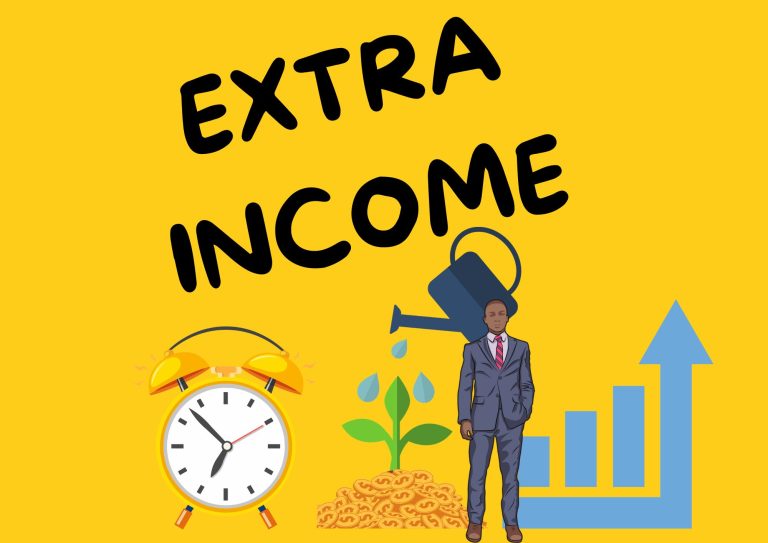Extra income is at least one additional source of income that helps you earn more money in addition to your regular earnings.
Income is your total earnings in the form of money or value that you or another entity, like a business, receives from doing work, in exchange for products or services, or from investments. An income is usually received regularly, for example, your wages and salaries, the return on investments, pension distributions, and other receipts.
Sources of extra income
These are the various ways people and businesses earn money. There are two sources of income: active and passive income.
What is active income?
This is usually the money you earn after performing and achieving specific duties or services according to an agreed task within a specified time frame. You earned this income when you work for a person or a company—be it manual labor, office work, or home-based service. You can work for yourself, which is called self-employment. Categories of active income include the following.
1. Employment income
You earn employment income when you are employed. It is the most common income source and typically includes:
a. Salaries and wages
This is the regular compensation you receive for work performed as an employee is usually paid weekly, biweekly, or monthly.
b. Overtime Pay
It is the additional compensation for working beyond the standard work hours or days is typically calculated at a higher rate than regular pay.
c. Bonuses and commissions
Financial incentives are paid for achieving specific performance goals or milestones, often used in sales or executive positions.
d. Tips and gratuities
Service industry workers, such as waitstaff or hotel staff, receive extra income as a reward for good service.
2. Self-Employment Income
You earn self-employment income when working for yourself. This income comes from running a business or working independently and may involve:
a. Sole Proprietorship
This income is earned by individuals who operate their businesses without formal legal structures, such as freelancers or consultants.
b. Partnerships
Income is generated through a shared business venture between two or more individuals who agree to distribute profits and losses according to their ownership interests.
c. Limited Liability Companies (LLCs)
Income earned by members of a Limited Liability Company (LLC), a hybrid business structure that combines a partnership’s tax flexibility with a corporation’s limited liability protection.
d. Corporations
Income derived from owning shares in a corporation, either through salary or dividends, depends on the shareholder’s involvement in the company.
e. Side hustles and part-time jobs
These are income earned from work outside one’s primary job or business, often to supplement primary income or pursue personal interests.
f. Freelance and gig economy work
Income earned by providing services on a per-project or short-term basis is often facilitated by digital platforms like Uber, Airbnb, or Upwork.
What is passive income?
This is money from activities in which you have no active or direct involvement. These may be investments you have made where you earn money or work you have done in the past that continues to pay dividends even in the present.
You can profit from your passive income sources whether you’re employed or not. You’re no longer solely dependent on your active income to cover your living expenses. Passive income describes the idea of “making money work for you.”
It takes years to build a sizable passive income. You need some sort of initial investment, be it in terms of finances or in terms of time, to start generating passive income.
- Examples that require an initial investment in finances include rental properties, stocks and bonds, and even businesses.
- Those that need an initial investment of time include income streams like online courses, affiliate marketing, and blogging.
But once you have made the initial investments and your ventures go well, you rarely need to put in additional effort after that.
Examples of passive income sources
1. Investments
Investments are income sources that involve placing capital into assets with the expectation of generating returns over time. You’ll earn:
a. Interest Income is from interest-bearing accounts and fixed-income securities like:
- Savings Accounts: Interest earned on deposits held in savings accounts at banks or credit unions.
- Bonds: Interest income is paid by the issuer of a bond, usually semiannually, until the bond’s maturity date.
b. Dividend Income is from owning shares in dividend-paying companies or investment funds like:
- stocks where dividends are paid to shareholders as a portion of a company’s profits.
- mutual funds, where dividends are distributed to investors who own shares in a mutual fund.
- exchange-traded funds (ETFs), where dividends are paid to investors who own shares in an exchange-traded fund (ETF), which typically tracks an index or a specific sector.
c. Capital gains are income earned from the increase in the value of an asset, such as real estate, stocks, or bonds.
d. Rental property income is income received from renting out residential or commercial real estate.
2. Royalties
Royalties are income earned from the use or sale of your intellectual property or natural resource rights. You’ll earn:
a. For intellectual property (books, music, patents), authors, musicians, inventors, and other creators earn an income from royalties for the use, sale, or licensing of their copyrighted or patented works.
b. For granting access to natural resources on your property, such as oil, gas, or minerals.
3. Limited partnership income is income you earn as a limited partner in a partnership. In this case, the limited partner provides capital but does not participate in business management.
4. Pensions and Retirement Income sources provide financial support during retirement years.
5. Annuities are insurance products that provide a steady stream of income in exchange for a lump-sum payment or series of payments made during the accumulation phase.
6. Crowdfunding and donations are income you raise through online platforms, such as Kickstarter or GoFundMe, to fund projects, businesses, or personal needs.
7. Bartering and trade is income in the form of goods or services received in exchange for other goods or services, rather than money.
8. Digital assets and currencies can generate income for you through trading and transactions.
What does it mean to have extra income?
This extra source of income will help you earn more money in addition to your regular salary. Building multiple streams of income is no longer a luxury; it has become a necessity. This is because of the financial risks involved with relying on one job for all of your incoming cash. You could lose it. So, it is critical to consider having at least one additional source of income.
Why do you need to have extra income?
- Raising inflation: Every year, if you notice, the price of products is increasing a situation called inflation. The product you purchased today at 100 will be 105 next year with a 5% inflation rate. So, if your income has not grown accordingly, you will be in trouble. An alternative source of income can go a long way toward paying the extra for you.
- You’ll cover the rising cost of health care and education. Expensive healthcare can burn a hole in your savings or put you into debt if you’re not prepared for emergencies. An extra income will help you provide better health care for your family or education facilities for your children.
- Offers You Job Security: When you lose your main job, you’ve still got a backup to get you by. Think of every job opportunity as a means to add money to your bank, and that’s how you can say you’ve got job security.
- Opens up unique work opportunities like working from home while taking care of the kids.
- You get to use your other talents outside of work. Explore your creative side. Start your own side business. Venture out to explore career opportunities that you may not have considered before.
- Pay off your debt, like student loans.
- You have more disposable income to do more financially.
- To achieve your financial goals like:
- saving for a vacation.
- building an emergency fund.
- building your house
- retiring sooner.
Ways to make extra income
- Ask for a raise.
- Search for a higher-paying job.
- Get a Side Hustle and Part-Time Jobs
- Do some freelance and gig economy work.
- Start a business
- Invest in interest-bearing accounts and fixed-income securities like savings accounts, bonds, stocks, mutual funds, or exchange-traded funds (ETF).
- Invest in real estate, insurance products, or digital assets and currencies.
- Become an author, musician, inventor, or any other creator to earn an income from royalties.
There are hundreds of specific activities in which you can earn extra income from the different categories listed above.
Conclusion
You need to find other ways to earn money as a backup plan for your finances. Whether you have a goal of paying off your debt, saving for something or just having more money for personal use, multiple sources of income are crucial. Moreover, having extra income not only enables you protect yourself from high inflation rates and increased prices for health care and education but also provides employment stability and access to specialized employment options.
Research on how to earn more money, which include, salary negotiations, seeking a second job, investing, pursuing a hobby, etc can help one get closer to her dreams. You can create passive and active sources of income and bring in some growth. Through a range of opportunities like investments, royalties, limited partnerships, pensions, and even more, it is possible to establish a stable income. When you start working towards higher income levels, you will open new possibilities on how to improve your financial position.


